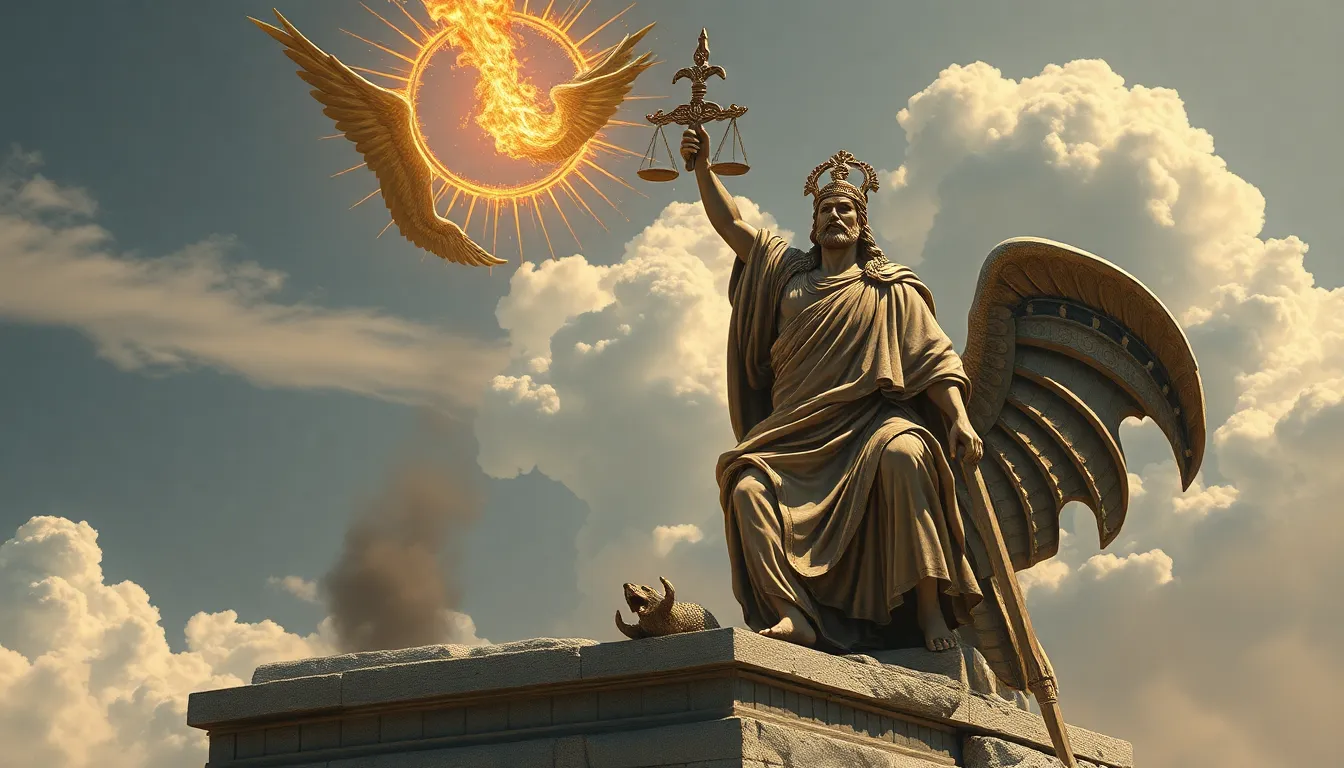The Role of Divine Retribution in Ancient Greek Justice
I. Introduction
Divine retribution, a central theme in ancient Greek culture, refers to the concept that the gods would exact punishment on individuals for their wrongdoings. This notion played a crucial role in the moral and ethical frameworks of ancient Greek society. Justice was not merely a human concern; it was believed to be enforced by divine entities, ensuring that order prevailed in both mortal and immortal realms. In this article, we will explore the significance of divine retribution as a pivotal element of justice in ancient Greece, examining its roots in mythology, literature, philosophy, and rituals.
II. The Concept of Divine Retribution
Divine retribution is deeply woven into the fabric of Greek mythology and philosophy. It embodies the idea that the gods are vigilant overseers of human behavior, rewarding the virtuous and punishing the wicked. This concept is encapsulated in the following:
- Nemesis: The goddess of retribution who ensures that hubris is punished.
- The Furies (Erinyes): Deities who avenge wrongdoings, particularly those related to familial offenses.
The moral and ethical implications of divine retribution extend beyond mere punishment; they reflect the societal values of justice, order, and balance. The belief that divine forces are actively engaged in human affairs reinforces the importance of ethical behavior and accountability.
III. Divine Retribution in Greek Literature
Greek literature is replete with examples of divine retribution, particularly in epic poetry and tragedies. In Homer’s “Iliad” and “Odyssey,” the characters often face the consequences of their actions, which are seen as reflections of divine will.
- Iliad: The wrath of Achilles, spurred by personal grievances, serves as a catalyst for suffering and chaos, illustrating the repercussions of anger and pride.
- Odyssey: Odysseus’s journey home is fraught with challenges that serve as divine tests of character and virtue.
In the tragedies of Aeschylus, Sophocles, and Euripides, the themes of fate and punishment are further explored. The chorus often plays a vital role in these works, emphasizing the moral lessons surrounding justice and retribution. They serve as a collective voice of society, reflecting and interpreting the divine will.
IV. The Intersection of Human Justice and Divine Retribution
The relationship between human laws and divine will is a complex and often contentious one in ancient Greek society. Human justice systems were thought to be influenced by the actions and decisions of the gods. Key case studies illustrate this intersection:
- The Trial of Orestes: Orestes avenges his father’s murder but is pursued by the Furies for his actions, highlighting the tension between personal vengeance and divine law.
- Agamemnon’s Fate: His hubris and betrayal lead to dire consequences, showing that even leaders are not immune to divine retribution.
This balance between human responsibility and divine intervention raises questions about free will and predestination, as individuals navigate their fates while being subject to the overarching influence of the gods.
V. Rituals and Practices Reflecting Divine Retribution
Ancient Greeks engaged in various rituals and practices to appease the gods and seek justice. These included:
- Religious Ceremonies: Offerings and sacrifices were made to deities like Nemesis to avoid their wrath and ensure fair treatment.
- Oracles and Omens: Individuals often consulted oracles to seek guidance on moral dilemmas, believing that divine signs could illuminate the path to justice.
- Public Festivals: Events such as the Dionysia served to reinforce social order, allowing communities to reflect on their values and the consequences of their actions.
Through these practices, the Greeks maintained a connection with their gods and sought to create a society where justice prevailed.
VI. Philosophical Perspectives on Divine Retribution
Philosophers like Plato and Aristotle offered critical insights into the nature of justice and retribution. Their perspectives include:
- Plato: In works like “The Republic,” he explores the idea of justice as a form of harmony, suggesting that divine retribution reflects a moral order that must be upheld.
- Aristotle: He emphasizes the importance of virtue and moral character, arguing that true justice involves a rational understanding of ethical behavior.
The evolution of thought regarding divine justice continued through the ages, leading to critiques of divine retribution as a concept. This shift eventually paved the way for secular justice systems that prioritize human reasoning over divine intervention.
VII. Case Studies of Divine Retribution in Historical Context
Significant historical events in ancient Greece were often interpreted as acts of divine retribution. For instance:
- The Plague of Athens: Many viewed it as punishment for hubris during the Peloponnesian War.
- The Fall of Troy: The destruction of Troy was seen as a consequence of Paris’s violation of divine hospitality.
Key figures such as Agamemnon and Orestes exemplify the intertwining of myth and history, where their fates serve as reflections of divine justice. These narratives continue to influence contemporary views on justice, highlighting the enduring legacy of Greek mythology.
VIII. Conclusion
In summary, divine retribution played a fundamental role in shaping the concepts of justice in ancient Greek society. Through mythology, literature, philosophy, and rituals, the Greeks developed a nuanced understanding of the relationship between human actions and divine consequences. The legacy of these ideas persists in modern concepts of justice, reminding us of the intricate balance between moral accountability and the forces that govern our lives. As we reflect on ancient Greek beliefs, we find that their insights remain relevant in addressing contemporary issues of justice and morality.




